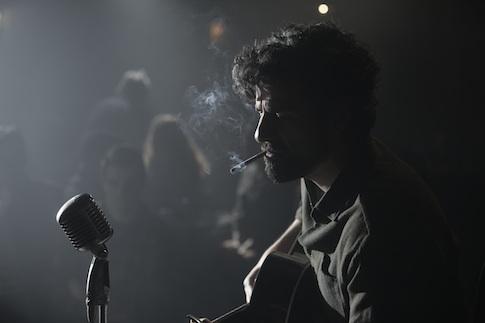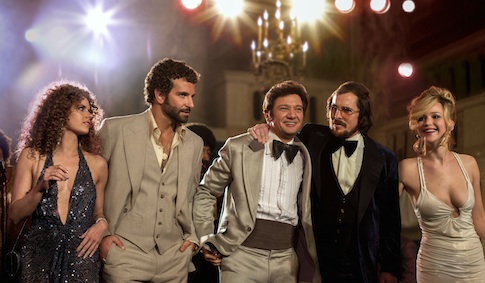American Hustle, David O. Russell’s latest, is in part a madcap heist film. It is in part a critique of American bureaucracy and the scams inherent in the system. And it is, in part, a virtuosic piece of filmmaking filled with verve.
But American Hustle is also wholly about life as a performance, the ways in which we perceive ourselves and wish to be perceived by others. We may not all lie and cheat and steal to get what we want, what we need, and what we think we want and need. We all know the front we present to the world, however. And we all know the weak points in that front.
Irving Rosenfeld (Christian Bale) works hard. He runs a window glass business he inherited from his father and which he built up as a child by creating business opportunities through destruction of property. He also has a chain of laundromats. And he has a side business as a con man, dealing in fake paintings that he passes off as legitimate-but-stolen ones. He’s hustling.
Sydney Prosser (Amy Adams) is working her way up from the floors of a strip club to the hallways of Cosmo. She falls in with Rosenfeld, adopts a British accent, and the pair start scamming desperate small businessmen out of modest sums of money through bank fraud.
Richie DiMaso (Bradley Cooper) is a small time FBI agent who thinks big. At least he wants people to think he thinks big. He wants to bring down mayors, congressmen, and the mob, not necessarily in that order. He’s not above demanding millions of bucks in bait money from his overworked and stressed out boss, Stoddard (Louis C.K.). He, like Irving and Sydney, is hustling (and in over his head).
And, finally, there’s Irving’s wife Rosalyn Rosenfeld (Jennifer Lawrence). She’s the most transparent of all the principals, if only because her crazy side overwhelms whatever ability to sneak around and fool people she might possess. She’s hustling Irving, and when we see how he treats her we understand why he spends his time hustling.
As you might expect from a cast of this caliber, the performances are top notch (when they’re not over the top). Russell’s latest film has been described as Scorsese-esque, and for good reason: The camera moves and zooms and whips around constantly—almost too much, in fact. This is less Scorsese than Scorsese on meth: frenetic and unfocused, American Hustle has trouble staying on task, and Russell does some weird things to give it an overtly cinematic feel.
One example: At the opening of an illicitly funded casino a spotlight burns out, and smoke wafts through the air. The camera slows, and into the frame—and out of the smoke—appear Sydney and Richie, like stars attending a movie premiere.
It’s all a bit much. But it’s entertaining. And it’s another reminder that, for these folks, the world’s a stage.
####

Inside Llewyn Davis is something like a sketch of a burgeoning cultural scene crossed with a biopic about a man who never lived—think Nashville by way of Walk the Line, were Johnny Cash a figment of your imagination.
Llewyn Davis (Oscar Isaac) is a struggling folk musician making the rounds in Greenwich Village, popping from couch to couch because he doesn’t make enough at the coffee shops and basket houses to afford his own place. He’s getting screwed by his manager, who isn’t passing to him any of the money from record sales, and he’s starting to wear thin with the folks on whose hospitality he relies.
In addition to his professional problems, he’s having relationship troubles with Jean (Carey Mulligan). Jean is one half of the folk duo Jim and Jean, and she’s in love with Jim (Justin Timberlake).
The film is vintage Coen Brothers: quietly funny, a bit arch, and beautifully shot. Though not terribly fond of folk music myself, I thought the songs were put together nicely and performed with real soul. The standout scene in this regard takes place when Llewyn joins Jim in the studio to put together a pop folk song, a jokey little thing about Kennedy and the space race that is both intended to mock popular tastes and quite good.
The most interesting aspect of Inside Llewyn Davis, from a filmmaking perspective, is that the brothers Coen refrain from giving their lead any of the expected easy outs. Indeed, Greenwich Village is a kind of purgatory from which he can’t seem to escape. Oh, he can drive out to Chicago—but only while accompanied by a pair of grotesques (one of them played by John Goodman with his characteristic lack of subtlety) and only so he can be informed that he doesn’t have what it takes to make a decent living in this business. He can’t muster up the courage to visit the kid he finds out he fathered despite driving right by the town he lives in. He can’t even give up on his dream of playing music for a living and rejoin the merchant marines, because he doesn’t have the proper paperwork.
He is doomed to wander the coffee house circuit for eternity (or until the punk scene emerges in the 1970s), picking up a few bucks here and there by sitting in on some studio sessions. All he can do is play his guitar and hope things turn around. Performing is all Llewyn has in his life. And he’s sadder for it.
